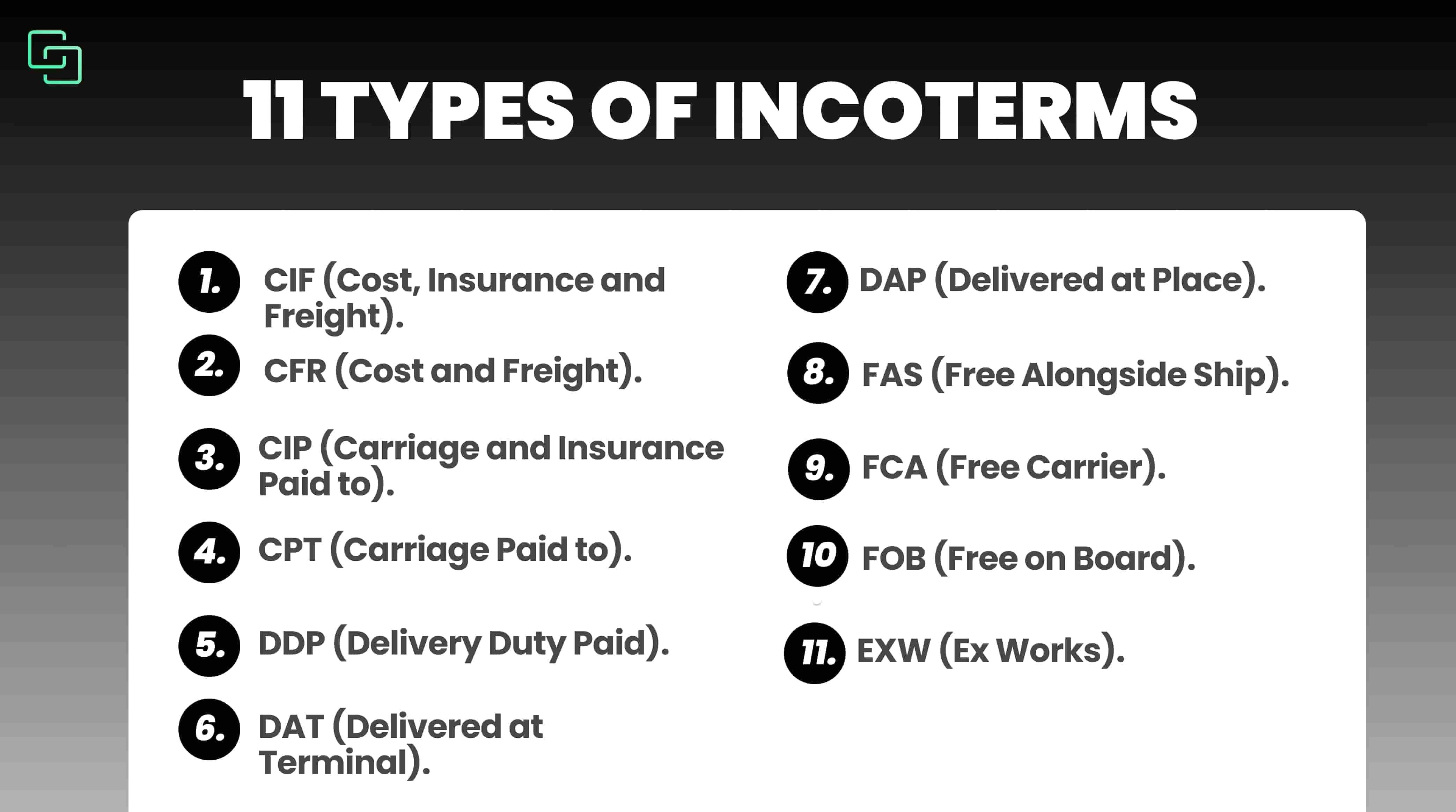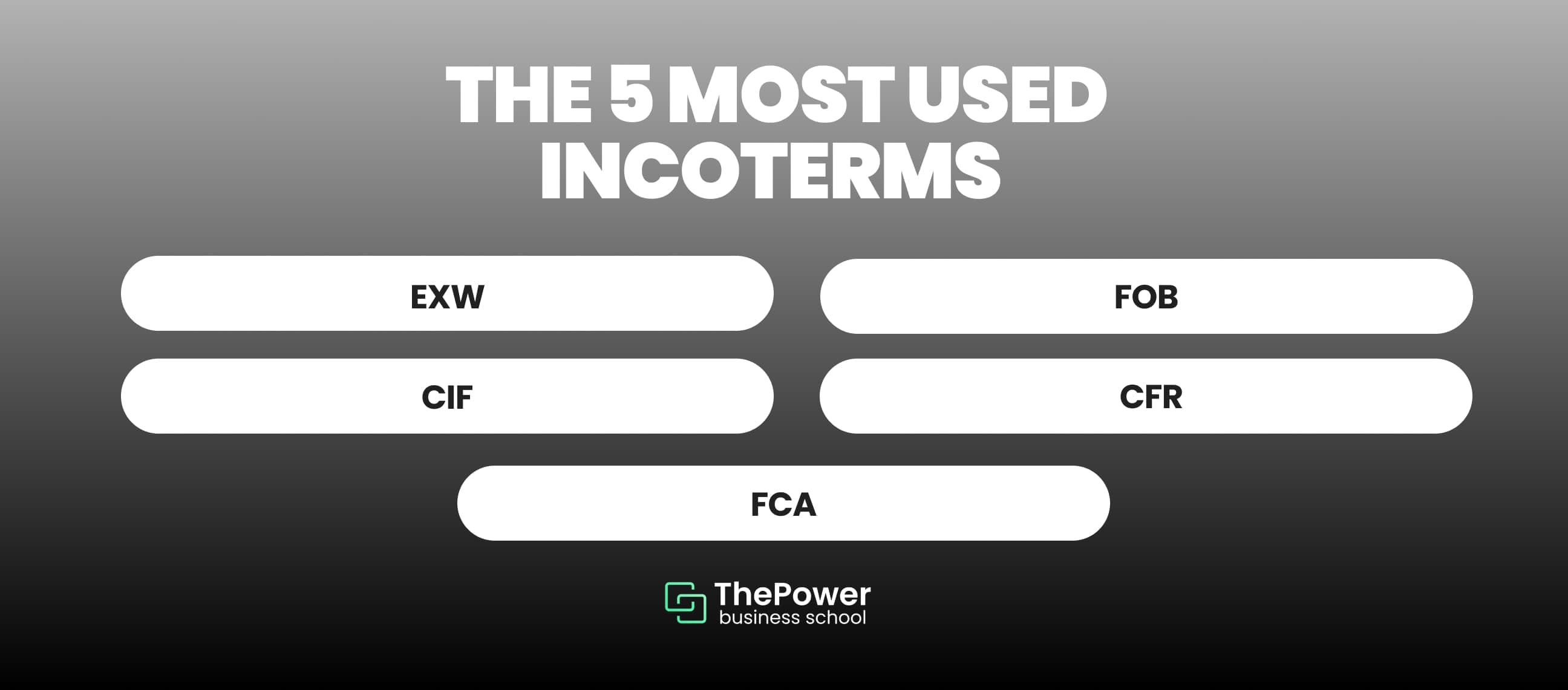
Claudia Roca
Incoterms (International Commercial Terms) are the international agreements that govern most of the world's trade, whether by sea, air, land, or inland waterway.
Incoterms are international standard rules. They seek to establish agreements for the international sale and purchase of goods, or in other words, responsibilities and obligations between buyers and sellers in their transactions.
They are the backbone of international trade, the international sale and purchase of goods, logistics, and transportation rules, as well as regulations for the delivery of goods. And they are used in international transactions to avoid misunderstandings and ensure fast, smooth, and seamless delivery of goods.
In this article, we will look at the different types of Incoterms and how they can help you in international trade. In addition, we will tell you how and by whom they are defined and how they are used in practice.
Who sets Incoterms?
Incoterms are published and regularly updated by the International Chamber of Commerce (ICC), a private, non-governmental organization based in Paris.
The ICC is responsible for establishing and updating Incoterms in consultation with experts from around the world, and its rules are widely recognized and used by businesses and governments worldwide.
The ICC established its first Incoterms in 1936, seeking to facilitate and improve international trade at all levels.
The Incoterms used today were updated in 2019 and became effective as of 2020.
Types of Incoterms and how they affect your business
There are 11 types of Incoterms:
CIF (Cost, Insurance, and Freight).
CFR (Cost and Freight).
CIP (Carriage and Insurance Paid to).
CPT (Carriage Paid to).
DDP (Delivery Duty Paid).
DAT (Delivered at Terminal).
DAP (Delivered at Place).
FAS (Free Alongside Ship).
FCA (Free Carrier).
FOB (Free on Board).
EXW (Ex Works).

These are the 11 Incoterms established by the International Chamber of Commerce. They are divided in four main categories: Group C, Group D, Group E, and Group F.
Let's take a look at them.
Group C: direct delivery carriage paid
Under these arrangements, the seller or exporter is responsible for all major transportation costs.
The seller is responsible until the goods have arrived at the buyer's port of destination. HOWEVER, in these cases, sellers are not liable for damage in the carriage of goods.
In other words, if a container cargo is damaged while being transported by ship, loaded, or unloaded by the seller, the seller is released from liability.
Group D: direct delivery
In direct delivery agreements, the seller takes care of the unloading of goods in the country of destination, including export charges, as well as customs charges. However, the buyer is responsible for import charges.
In these agreements, the sellers are responsible until the goods are unloaded at the previously agreed port. Once the cargo arrives at the port and is unloaded, the responsibilities fall on the buyer.
Group E: outbound delivery
These are the most profitable Incoterms for sellers. In these agreements, the seller only has to deliver the goods within his own premises.
In other words, sellers can save all shipping, loading, freight, customs, and export costs. All that’s left to the seller is to pack the goods and deliver them.
Buyers, on the other hand, assume all costs from the moment they receive the goods, as well as all responsibilities for what happens to them.
Group F: indirect delivery
Group F Incoterms benefit buyers the most and by far.
Under these agreements, sellers are responsible for all the costs of loading and transporting goods. In addition, they must take care of the costs of exports, clearance, and vehicle charges if necessary.
In these cases, the seller is also responsible for customs formalities and customs clearance, whether at ports, airports, stations, or warehouses. Likewise, the seller must make the delivery at a point previously agreed with the buyer in the destination country.
And in these cases, the buyer is responsible once the goods have been cleared at the agreed place.
The buyer does not have to worry about handling, transport, or customs charges.
The 5 most used Incoterms and which one is best for you
Although there are 11 Incoterms established by the International Chamber of Commerce applicable for different cases, there are 5 Incoterms that stand out above the others:
EXW
The EXW (Ex Works) Incoterm is one of the most widely used worldwide.
The EXW is based on the fact that the seller fulfills his duties once he has delivered the goods and they are inside his facilities -or another place previously agreed with the buyer-. Once there, they are available to their buyers and the seller is released from liability.
Moreover, in this scenario, the seller is not obliged to load the goods on his buyer's transports, nor to clear them through customs. He only has to deliver them at the entrance of his warehouses. His only obligation is to make the cargo ready for the tester.
Under this agreement, the buyer is the sole bearer of delivery and transportation costs and risks, such as customs payments, taxes, duties, freight, transportation, loading, and unloading.
EXW agreements are among the most beneficial to sellers but represent considerable risks for buyers.
This agreement, although one of the most widely used in the world, is most recommended for domestic shipments.
FOB
The Free of Board Incoterm is intended for maritime transport, and under this agreement, the seller MUST load the goods on the buyer's vessels.
Unlike EXW, here the seller assumes the risks and costs of logistics and transportation and his responsibility for the goods ends once the cargo is on the buyer's vessel.
Once on the vessel, all costs and responsibilities pass to the buyer, including transportation, customs, unloading, freight, and carriage in the destination country.
This Incoterm is not recommended for container cargo because, in practice, many containers are delivered to ports and warehouses days before loading.
And if something happens to the container or the goods in it within this time frame, there would be a dispute as to who is responsible for the damage.
CIF
Cost, Insurance, and Freight is also an Incoterm unique to ocean transportation, and is one of the most buyer-friendly agreements.
Under this agreement, the seller is responsible for getting the goods to the port indicated by the buyer. He then goes on to load the goods on the buyer's vessel. And here, the seller is released from liability.
This agreement is similar to the previous one, but here the seller must bear the costs of packaging, departure, national and international freight, customs, and insurance.
In this agreement, the seller is OBLIGED to take out insurance and assumes all risks until the cargo reaches the buyer's vessel.
CFR
The CFR is an Incoterm quite similar to the previous one. In this agreement, the seller assumes all costs of shipping, freight, transfer and loading of goods until the cargo has arrived at the port of destination until the cargo is ready to be exported.
From this point on, unloading costs will be borne by the buyer. However, unlike the previous one, the seller is not obliged to take out insurance.
In practice, both buyers and sellers agree on whether to take out insurance and how to allocate the costs.
FCA
The Free Carrier Incoterm is an agreement applicable to sea, land, and air transport and is one of the most beneficial agreements for buyers. It’s also one of the clearest and most specific, so it’s perfect for transporting containers.
In this agreement, sellers can deliver cargo to a specific point, whether it’s a port, warehouse, or other facilities of the buyer. But he’s not obliged to load the goods.
The seller's responsibility ends once the cargo is delivered. Thereafter, the costs of loading, stevedoring, and shipping are borne by the buyer. Also outbound expenses, duties, and international freight, among others.

Incoterms vs. Delivery Terms: Are they the same?
In essence, Incoterms are international shipping terms. And they are widely used for small, medium, and large-scale purchase and sale agreements.
But beware!
Incoterms do not replace the need for formal written agreements and do not address other important aspects of international trade, such as tariffs, regulations, national agreements, and Free Trade Agreements (FTAs).
When it comes to international trade, thoroughness is a must for both parties, especially when it comes to Incoterms.
Therefore, if you plan to start buying or selling goods internationally, we encourage you to learn more about your country's import and export laws. Also, familiarize yourself with international laws and regulations.
Remember that Incoterms are agreements established by the International Chamber of Commerce, but they do not replace contracts or written agreements. On the contrary, they must be part of these so that the sale and purchase flow smoothly.
Did you have any other questions about Incoterms, did we miss anything? Tell us what else you’d like to know about these agreements and how you’d take advantage of them.
Jun 26, 2023








